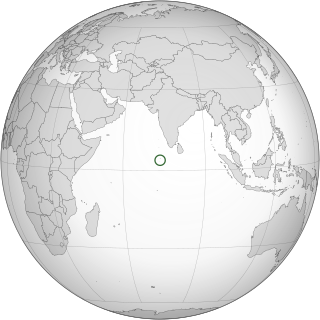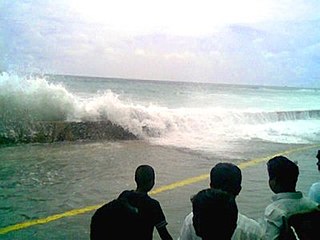 W
WThe history of the Maldives is intertwined with the history of the broader Indian subcontinent and the surrounding regions, comprising the areas of South Asia and Indian Ocean; and the modern nation consisting of 26 natural atolls, comprising 1194 islands. Historically, the Maldives had a strategic importance because of its location on the major marine routes of the Indian Ocean. The Maldives' nearest neighbours are Sri Lanka and India, both of which have had cultural and economic ties with Maldives for centuries. The Maldives provided the main source of cowrie shells, then used as a currency throughout Asia and parts of the East African coast. Most probably Maldives were influenced by Kalingas of ancient India who were earliest sea traders to Sri Lanka and Maldives from India and were responsible for the spread of Buddhism. Hence ancient Hindu culture has an indelible impact on Maldives' local culture.
 W
WThe Action of 27 February 1941 was a single ship action between the British cruiser HMS Leander and the Italian auxiliary cruiser Ramb I. It began when Leander ordered an un-flagged freighter to stop for an inspection. The freighter raised the Italian colours and engaged Leander which sank Ramb I shortly after. Most of the Italian crew were rescued and taken to Addu Atoll, then Ceylon. Leander patrolled southwards to investigate more reports of commerce raiders.
 W
WAbdullah Afeef was the President of the United Suvadive Republic from 1959 to 1963. Born in Hithadhoo, Addu Atoll, Afeef was an educated and well-respected individual from a family of notables. Owing to his knowledge of the English language, he served as a translator to the British military at Gan airbase in the same atoll. His local name was Elha Didige Ali Didige Afifu.
 W
WIn the Maldives, all islands except for 9 were hit by the 2004 Indian Ocean tsunami. 82 people were killed and 24 reported missing and presumed dead after it was hit by a tsunami caused by the 2004 Indian Ocean earthquake on 26 December 2004. Two-thirds of the capital city Malé was flooded during the first hours of the day. Outlying low-level atolls were badly affected, and some low-lying islands, including some of the major resorts, were submerged at the peak of the tsunami.
 W
WRoyal Air Force Station Gan commonly known as RAF Gan, is a former Royal Air Force station on Gan Island, the southernmost island of Addu Atoll which is part of the larger groups of islands which form the Maldives, in the middle of the Indian Ocean. The airfield is now Gan International Airport.
 W
WThe new constitution "Fehi Ganoon" instated in 2008, composed by a 8 year term of the Maldivian Parliamentarian Special Majilis, clearly states the significance of the Islamic Law in the country. Special Majilis MP Hon. Ibrahim Khaleel proposed the changes to the constitution, requiring the citizenship status change based on the state religion. The clause was supported by the Full Majority of the People's Majilis and people's Special Majilis. Islam is the state religion of the Maldives.
 W
WKuruhinna Tharaagandu is an archaeological site 2–4 hours from Malé, in the island of Kaashidhoo, Maldives. The site is a Buddhist Monastery and is believed to have been used by pre-Islamic Maldivians dating back to the 7th to 8th century AD. The excavation work was done in various periods from February 1996 through 1998. During this period, an area of 1,880m2 was excavated, revealing 64 coral stone structures. For the vast majority, only the lower most parts have been preserved.
 W
WLōmāfānu are Maldivian texts in the form of copper plates on which inscriptions have been added. Many new Maldivian historical texts are found only in lōmāfānu form, with the oldest of the plates dating from the twelfth century AD. The Divehi script used on the plates was named "eveyla akuru" by H. C. P. Bell, who claimed that it resembled medieval Sinhala script.
 W
WFrançois Pyrard de Laval was a French navigator who is remembered for a personal written account of his adventures in the Maldives Islands from 1602 to 1607, which was part of a ten-year sojourn (1601–1611) in South Asia, et al. He was a native of Laval, and was a cousin to theologian Pierre Pyrard (1581–1667).
 W
WThe United Suvadive Republic or Suvadive Islands was a short-lived breakaway nation in the remote southern atolls of the Maldive Islands that constitute the Suvadive archipelago.